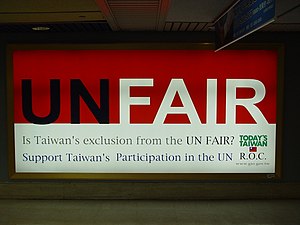
The Democratic Progressive Party (DPP) is a centre to centre-left Taiwanese nationalist political party in Taiwan. As the dominant party in the Pan-Green Coalition, one of the two main political camps in Taiwan, the DPP is currently the ruling party in Taiwan, leading a minority government that controls the presidency and the central government.

Taiwan, officially the Republic of China (ROC), is governed in a framework of a representative democratic republic under a five-power system first envisioned by Sun Yat-sen in 1906, whereby under the constitutional amendments, the President is head of state and the Premier is head of government, and of a multi-party system. Executive power is exercised by the Executive Yuan. Legislative power is vested primarily in the Legislative Yuan. Taiwan's judiciary is independent of the executive and the legislature. In addition, the Examination Yuan is in charge of validating the qualification of civil servants, and the Control Yuan inspects, reviews, and audits the policies and operations of the government.

The Taiwan independence movement is a political movement which advocates the formal declaration of an independent and sovereign Taiwanese state, as opposed to Chinese unification or the status quo in Cross-Strait relations.
The Taiwan Solidarity Union (TSU) is a political party in Taiwan which advocates Taiwan independence, and is affiliated with the Taiwanese localization movement. It was officially founded on 12 August 2001 and is considered part of the Pan-Green Coalition. Unlike the Democratic Progressive Party, its larger companion party in the Pan-Green Coalition, the TSU actively campaigns for the creation of a de jure Republic of Taiwan.
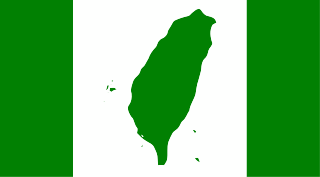
Several proposals for a flag of Taiwan have been initiated by supporters of the Taiwan independence movement to replace the flag of the Republic of China as the national flag flown over Taiwan. Supporters of the movement object to the use of the flag of the Republic of China since it was designed by and is closely associated with the Kuomintang. However, no single flag has been established as the symbol of the independence movement, and supporters of Taiwanese independence, such as the Democratic Progressive Party, have accepted the flag of the Republic of China for the time being and have not pushed for a new flag. The flag of the Republic of China in current use is defined in the 6th article of the Constitution, and amending the Constitution requires a referendum which would only succeed with wide political support. The Republic of China, originally based in mainland China, retreated to Taiwan in 1949 and established its capital in Taipei. The region, now commonly referred to as "Taiwan" in vernacular, retains its official name "Republic of China" and still officially claims territories governed by the People's Republic of China, just as the PRC claims all ROC territories.

The Kaohsiung Incident, also known as the Formosa Incident, the Meilidao Incident, or the Formosa Magazine incident, was a crackdown on pro-democracy demonstrations that occurred in Kaohsiung, Taiwan, on 10 December 1979 during Taiwan's martial law period.
"Chinese Taipei" is the term used in various international organizations and tournaments for groups or delegations representing the Republic of China (ROC), a country commonly known as Taiwan.
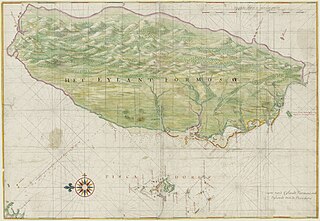
As a result of the surrender and occupation of Japan at the end of World War II, the islands of Taiwan and Penghu were placed under the governance of the Republic of China (ROC), ruled by the Kuomintang (KMT), on 25 October 1945. Following the February 28 massacre in 1947, martial law was declared in 1949 by the Governor of Taiwan, Chen Cheng, and the ROC Ministry of National Defense. Following the end of the Chinese Civil War in 1949, the ROC government retreated from the mainland as the Chinese Communist Party (CCP) proclaimed the establishment of the People's Republic of China. The KMT retreated to Taiwan and declared Taipei the temporary capital of the ROC. For many years, the ROC and PRC each continued to claim in the diplomatic arena to be the sole legitimate government of "China". In 1971, the United Nations expelled the ROC and replaced it with the PRC.
A consultative referendum was held in Taiwan on 20 March 2004 to coincide with the 2004 presidential elections. Voters were asked two questions regarding the cross-strait relations, that is, between Taiwan and China. The initiation of this referendum by President Chen Shui-bian came under intense criticism from China because it was seen as an exercise for an eventual vote on Taiwanese independence. The Pan-Blue Coalition urged a boycott, citing that the referendum was illegal and unnecessary.

The United Nations General Assembly Resolution 2758, also known as the Resolution on Admitting Peking, was passed in response to the United Nations General Assembly Resolution 1668 that required any change in China's representation in the UN be determined by a two-thirds vote referring to Article 18 of the UN Charter. The resolution, passed on 25 October 1971, recognized the People's Republic of China (PRC) as "the only legitimate representative of China to the United Nations" and removed "the representatives of Chiang Kai-shek" from the United Nations.

The 2004 Taiwanese legislative election was held on 11 December 2004. All 225 seats of the Legislative Yuan were up for election: 168 elected by single non-transferable vote, 41 elected through party-list Proportional representation, eight elected from overseas Chinese constituencies on the basis of the proportion of nationwide votes received by participating political parties, eight elected by popular vote among the aboriginal populations. Members served three-year terms beginning on 1 February 2005, and ending 31 January 2008. The next term served four years.

Terry Gou is a Taiwanese billionaire businessman and politician. Gou is the founder and former chairman and chief executive officer of Foxconn, the world's largest contract manufacturer of electronics. Founded in 1974, Foxconn grew to become an international business empire, becoming the largest private employer and exporter in mainland China with a workforce of 1.2 million. As of 2024, Gou had a net worth of US$10.4 billion.

Presidential elections were held in Taiwan on 22 March 2008. Kuomintang (KMT) nominee Ma Ying-jeou won with 58% of the vote, ending eight years of Democratic Progressive Party (DPP) rule. Along with the 2008 legislative election, Ma's landslide victory brought the Kuomintang back to power in the Republic of China.
The Four-Stage Theory of the Republic of China or the Theory of the Four Stages of the Republic of China is a viewpoint proposed by Chen Shui-bian, the President of the Republic of China from 2000 to 2008, in 2005. It is a viewpoint regarding the political status of the Republic of China, whose government retreated to the island of Taiwan after the Chinese Civil War in 1949. The main idea of the theory is that the time line for the development of the Republic of China can be classified into four stages, which are:
- The Republic of China on the mainland, 1912–1949
- The Republic of China arrival to Taiwan, 1949–1988, before Lee Teng-hui's presidency
- The Republic of China on Taiwan, 1988–2000, during Lee Teng-hui's presidency
- The Republic of China is Taiwan, 2000–now, during Chen Shui-bian's presidency
Referendums in Taiwan at both the national and local level are governed by the Referendum Act of Taiwan, which was enacted by the Legislative Yuan in December 2003. Citizens can propose laws via referendums at the national and local levels. The Referendum Act also allowed people to make changes or abolish laws by referendums.

The New Tide faction was the largest faction of the Democratic Progressive Party (DPP) in Taiwan before the party voted to dissolve all factions in 2006. Though dissolved, it remains the largest faction in the DPP.
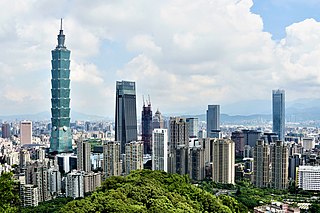
In Taiwan, the North–South divide refers to the claimed uneven distribution of resources in regard to political, wealth, medical, economic development, education, and other aspects across Taiwan over past decades that has drawn the social and cultural differences between Northern Taiwan and Southern Taiwan.

The Taiwan People's Party (TPP) is a centre-left political party in Taiwan. It was formally established on 6 August 2019 by Ko Wen-je, who serves as its first and current chairman. The party considers itself as an alternative third party to both the Democratic Progressive Party and Kuomintang.

The Taiwan Action Party Alliance (TAPA) was a political party in Taiwan established on 18 August 2019 and dissolved on 19 January 2020.
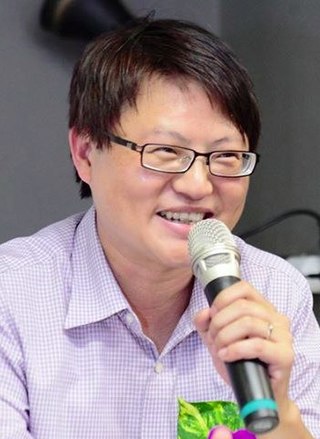
The Taiwan Statebuilding Party is a political party in the Republic of China (Taiwan). The party was established in 2016 as Taiwan Radical Wings. The party is considered a rather close ally of the Democratic Progressive Party, while fighting to replace opposition parties whom TSP unilaterally claims as "not loyal to Taiwan", such as Kuomintang and Taiwan People's Party. In the 2024 Taiwanese legislative election, TSP failed to gain any seat in the Legislative Yuan and lost its status as a national political party.

